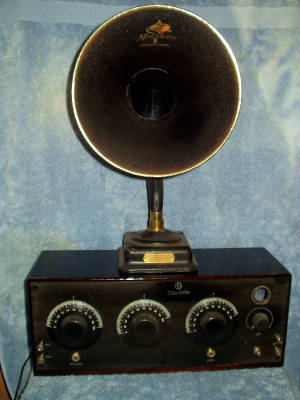|

Here is a little crystal set that was very common in the mid to late 1920's but scarce today. Made by the
the Brooklyn Metal Stamping Corp., these were sold by the S.S. Kresge stores (now K-mart). This one is stamped
out of brass, so is the early version, as later versions were of stamped steel. Actually works pretty good for an
inexpensive set.

Here we have a little crystal reciever built sometime in the early 1920's. Believe it or not, it is a factory-built
set, but the label on the bottom is so faded, I can't read it anymore. Anyone out there able to identify it?

This is a homebrew (home-built) crystal broadcast and shortwave reciever, ca. 2005 (yes, I made it, out of old parts
and an old file box. The only new parts are the wood screws.). Uses 2 basket-weave coils each with 3 center taps
(1 coil for AM, 1 for SW), an antique crystal detector of unknown make, and an Apex vernier dial. I had my own ideas
on what a 1920's crystal radio should look like, so I built one. Works great! Shown with a Western Electric model
509W headset.
|
 |
|

A 1923 FADA model 160 4 tube Neutrodyne receiver. Just finishied restoring this one and it looks great. Works
fantastic as well. This was F. A. D. Andrea's first factory built radio, and is also the first factory built Neutrodyne,
beating out Freed-Eisemann's NR5 by only a month. Also shown with a Magnavox model M4 speaker from 1924.

Here we have a British Marconi crystal reciever ca. about 1910's. Uses a spiderweb coil with 3 center taps and
a variable condenser that is weird. Model number unknown. Actually works pretty good considering how simple it
is.
|
 |
|
|
 |
|
|
|

